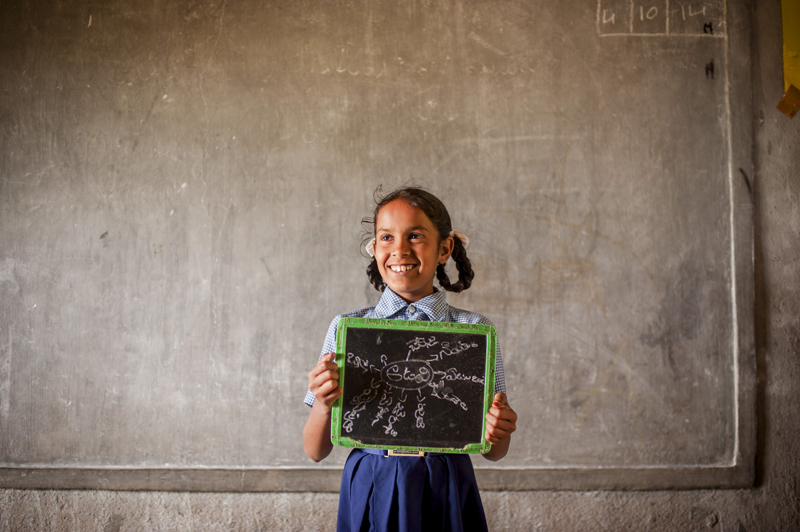Posted by Akshara Mehra
Being educated is a distant dream for many women in the world. As per the reports of the United Nations, women make up two-thirds of the illiterate population. Education for women, especially higher education is not a priority in majority of the Indian households even in the 21st century.
Whenever girls are lucky enough to find more opportunities regarding education and career, what they need to choose becomes not their solo decision but the decision of the family members keeping in mind various parameters. It is expected of girls that they marry at a certain age and take up responsibilities related to family and children. Hence, many times, women themselves and along with the family choose options related to education and career which can be easily managed with familial responsibilities.
Support systems for women are majorly absent and since being ambitious and having a career is mostly seen as something problematic for women and as a potential danger for the family, it is never promoted. Choosing a career of one’s own in Indian households is no doubt, very challenging.
But why are women’s education and career perceived as problematic in Indian families? A short ad film perhaps answers the same, “Ladki haath se nikal jaayegi” (The girl will slip out of our control). Education enhances intellectual capability and mobility of women, but interestingly, female mobility is often seen as a threat to our social system.

A woman who is educated and free to make her own decisions is always seen as ‘too advanced‘. She is perceived as someone who can go against family and social norms. One of the participants in a session about the education of women mentioned that she was often told, “Delhi ki hawa lag gayi, zyada padhane ka yahi nateeza hai, muh chala rahi hai” (She has gotten Delhi’s influence, this is the result of educating her, she is arguing.) Citing opinions is often misunderstood as arguing and becomes an issue in families. On the other hand, higher education asserts the importance of having opinions and taking decisions oneself.
The very idea of educating a woman as articulated by the famous quote ”If you educate a woman, you educate a family” is deeply linked with biases and patriarchal ideas echoing around us. The idea that comes through is that ultimately, education should be provided to women so that future families can be benefited out of that, and not because women can be independent. Education and career for women are expected to be in fields which align with the family responsibilities and do not hamper them.
Women’s professional growth and development is not seen as a need or necessity. Often, they avoid promotions for the fear of getting transferred, as that may affect their personal and family life. On the other hand, being associated more with the family, at times women are seen as incompetent and are often not preferred in certain jobs. Motherhood is perceived sometimes as an obstacle in career growth. Safety becomes another concern for families who may tend to be a little over protective, especially with jobs that involve traveling
Women earning high income are sometimes seen as a threat to the society as they are independent enough to not to follow the social norms imposed over them and they may rebel. They may be opinionated and may assert themselves, which can be perceived as the absence of womanly qualities needed. They may stop being “sanskari” in the eyes of people and families may not want that. Education grants women freedom and free women are mostly perceived as a threat.
Existing stereotypes portray that highly educated or high earning women face problems in finding a suitable match and since marriage is seen as something very necessary, career and education often takes a backseat for women. On the other hand for men, career becomes a necessity. Women mostly do not have the choice to choose streams, subjects or careers of their own. One of the participants mentioned, “I was asked to become a teacher by my parents so that I can continue the job post marriage too.When I said I don’t like teaching, I was told it’s an easy job”.

It is a strange truth that gender still decides careers in the 21st century. Engineering, corporate jobs, and field jobs are often thought as inconvenient and less suitable for women. The very idea that familial responsibility is the sole duty of women often discourages women from taking up these careers. Even if women are motivated enough, families do not promote it, and women end up either taking up ‘easy jobs’ like teaching or as homemakers.
It is not a myth that India has the largest number of qualified housewives. Women in India are expected to manage household chores and become devoted to household duties despite their professional qualification and education, while the same does not happen with men.
Running the family is something for which women are oriented from childhood. Working women who wish to continue working are told prior to marriage to manage both family and work with family as their first priority. Their income is seen as secondary as the man is the bread-earner. In certain cases where the husband earns sufficiently well, the woman may be dissuaded from taking up a job.
Also read: NCERT Manual & Gender-Sensitive, Trans-Inclusive Approaches To Education
Education gives rise to intelligent, autonomous women who digress boundaries and question the society. Intellectual women are often seen as a threat because in the words of a participant, “They can spoil other women too”. Why should women question and why can’t they follow what they are being told? – is the view that emerges. In a nutshell, women are expected to follow whatever the society or family dictates and never raise questions
Women’s professional growth and development is not seen as a need or necessity. Often, they avoid promotions for the fear of getting transferred, as that may affect their personal and family life. On the other hand, being associated more with the family, at times women are seen as incompetent and are often not preferred in certain jobs. Motherhood is perceived sometimes as an obstacle in career growth. Safety becomes another concern for families who may tend to be a little over protective, especially with jobs that involve traveling.

As one participant mentioned, “Powerful women are seen as a threat to society. Why would this patriarchal society want to make women more powerful by giving them the freedom to decide?”
But is society the only reason discouraging women for higher studies? As one of the participants mentioned, “The educational services being offered by this country are limited and the amount of exposure to girls is negligible. They often do not know what options they have for higher studies.”
Education gives rise to intelligent, autonomous women who digress boundaries and question the society. Intellectual women are often seen as a threat because in the words of a participant, “They can spoil other women too”. Why should women question and why can’t they follow what they are being told? – is the view that emerges. In a nutshell, women are expected to follow whatever the society or family dictates and never raise questions.
As a result, very few women are able to dream in the 21st century and pursue a career of their own. The very idea which promotes and sees women as individuals to be devoted totally to families needs to be thought upon and condemned.
Also read: Dalit Women Learn Differently: Experiences In Educational Institutions
This is the third article in a series based on a Social Action Project called ‘Consciousness Raising Sessions on ‘The Role of a Female in the Indian Household’. This was formulated by fellows with Participatory Research in Asia (PRIA)’s Youth-N-Democracy program. The Social Action Project aimed to connect with women in the age group of 19-26 years of age in order to introduce them to the idea of how unseemingly common everyday activities turn out to be deeply discriminatory.
Akshara Mehra has completed her Masters in Social Work from Jamia Millia Islamia. Currently, she is working with Professional Assistance for Development Action (PRADAN) as a Development Apprentice. Previously, she has interned with various organizations in the non- profit sector. She is an avid reader with keen interest in subaltern literature and poetry. She may be found on Medium, Instagram and LinkedIn
Featured Image Source: Odisha Watch
About the author(s)
We are a global centre for participatory research and training. For 39 years, PRIA has focused on empowerment of the excluded through capacity building, knowledge building, and policy advocacy. We work to make democracy work for all.





